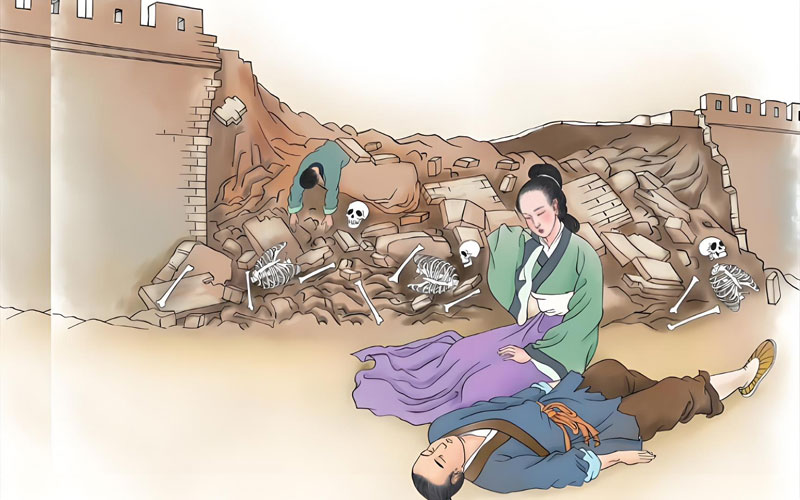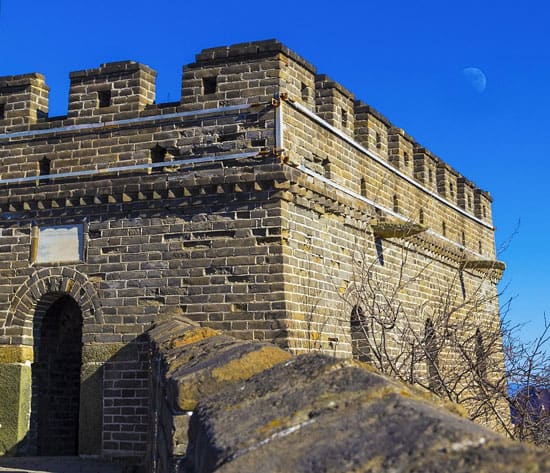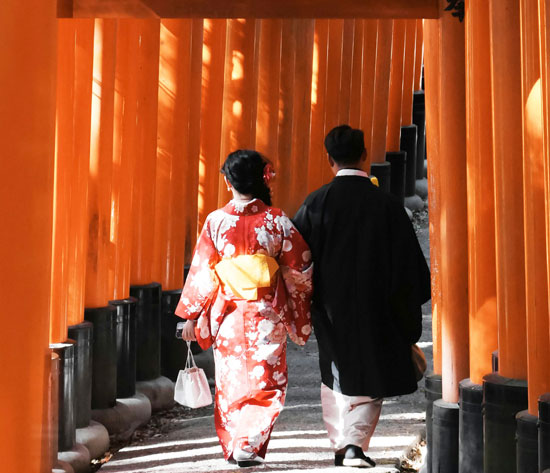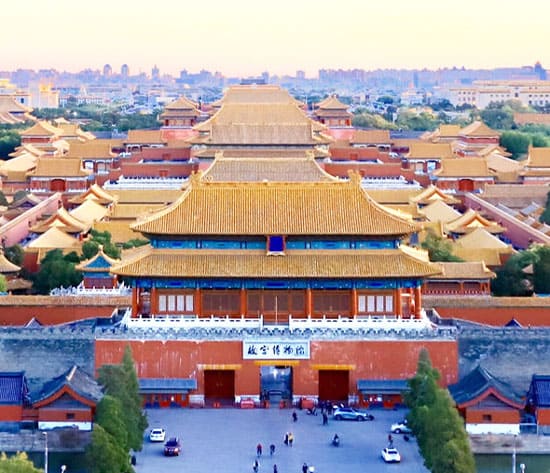As one of the New Seven World Wonders, the Great Wall is definitely the iconic landmark, built with wit, blood, sweat, and tears. It is not only a symbol of Chinese culture but also a witness to the changes in Chinese history. It was the complete military defense system in the old days. For now, China Great Wall is the UNESCO World Heritage Site, an internationally recognizable human landscape, attracting tons of visitors to glance at its majesty.
For over 2,600 years, there have been many Great Wall legends being spread among folks. Those stories were born in various backgrounds in each dynasty. Most of them are a dispensable part of Chines history, showcasing the wisdom of ancient people. In this article, you can explore and learn more about the Great Wall legends. For a history fanatic, you can not miss this.
1. Lady Meng Jiang Weeps at the Great Wall
Of all the legends regarding the Great Wall, the bitter tears of Lady Meng Jiang collapsed the Great Wall (孟姜女哭长城, mèng jiāng nǚ kū zhǎng chéng) is the most popular circulated one. The story happened during the reign of Emperor Qin Shi Huang in the Qin Dynasty (221-206 BC) when numerous male peasants, rebels, and soldiers were forcibly sent to build the Great Wall of China. In addition, a surplus of money and resources was put into the construction. Of all the male laborers being sent to build the Great Wall, it included a young man called Fan Xiliang.
Three days after getting married, Fan was sent to join in the construction of the Wall. However, soon after, he died at the building site due to the tough environment, like hunger, coldness, and fatigue. Since Fan’s departure, his wife, Meng Jiangnv, never heard of him. She came to the Great Wall to find her husband after hardships but only received that sad news. Being desperate, she cried her heart out for three days and three nights, whose grief shook the Great Wall and it finally collapsed. Just then, her husband’s body was exposed.
This story of Meng Jiangnu is one of the most famous Chinese love stories, which is widely spread in the form of Chinese operas and songs.

2. The Brick on the Jiayuguan Pass
A story of the Great Wall of China happened in one of the most famous and well-preserved sections of the Great Wall, Jiayuguan Pass. When the Jiayuguan Pass was built during the Ming Dynasty (1368 -1644 BC), a craftsman called Yi Kaizhan, who was extremely good at arithmetic and responsible for fixing the Wall. And he calculated the size of the Great Wall, which needs 99,999 bricks to construct.
The supervisor did not believe what he said and claimed that once he miscalculated, all workers would be punished. However, when it was finished, there was just one brick left over. The overseer was happy about the view and ready to punish them.
At this time, Yi said the brick was supernaturally put there to repair, once moved, the whole Wall would collapse. In this way, nobody dared to move the brick. Since then it was regarded as a miracle and kept there all the time, also the symbol of solidity and eternity.
3. Lighting Beacon Fire for Fun
There is a legend of the Great Wall of China occurring during the Western Zhou Dynasty (1046 BC-771 BC). The King You of the Western Zhou, a tyrant, had a concubine named Bao Si. Though gorgeous, she never smiled. The King You ordered to light the alarming fire on Beacon Tower to please the concubine. The marquesses and soldiers saw the fire and thought that enemies were about to invade and came to assist. When they reached there, they found being teased, and there were invasions. They angrily went back with disappointment. When seeing the sight, Bao Si laughed. After that, they tried several times. Later, the enemies really invaded the Western Zhou, and the King You lit a beacon fire to ask for help. But nobody came to help. At last, the King was killed and the Western Zhou Dynasty perished. This story is called 烽火戏诸侯 (fēng huǒ xì zhū hóu) in Chinese, which literally means setting Great Wall beacon fires to make fun of dukes.
![]()
4. Transporting Stones via Icy Track
Some sections of the Great Wall were built in the rough terrains in China, like the desert and the mountains. According to the legend, in the process of construction, it needed tens of thousands of stone bars 2 meters long, 0.5 meters wide, and 0.3 meters thick. However, when workers cut the stones into strips in Black Mountain, nobody could move them and no trailers could carry.
Besides, the mountains were high and the road was far, there were no other ways to figure it out. While cutting the stone strips, all laborers worried that winter was about to come, but no one strip was carried out of the mountain. If behind the schedule, they may be punished and gain no money.
As all craftsmen were upset, suddenly, there was a thunder flashing from the top of the mountain and a brocade floating from the clouds. Craftsman rushed to cup it. A few lines were looming up the brocade. After reading those words, it dawned on everyone.
With winter coming, people built a road from the mountain to the city, sprinkled water on the road to form an icy road, and put the stone bars into the track to slide on the ice.
Just as they had expected, all stone strips were successfully sent to the Jiayuguan City. In this way, they were ahead of schedule. All craftsmen constructed temples around the City to worship the God and thank him for his blessing, where it later became the place artisans would go before construction embarked on.
5. Striking the Stone to Make Swallow’s Chirp
The popular legend of the Great Wall is about the Jiayuguan Pass. It was said that the city gate opened when dawn came and closed at night in ancient times. A pair of swallows flew out of the gate in the morning. They came back in a dark and stormy night. When they returned to the nest, the strong wind separated them, the female one reached first. When the male swallow flew to the gate, the gate was closed. Being blocked from the gate, he started to whine but it was still shut. Then he hit the wall and died.
Without seeing her husband, the female swallow was so anxious that she kept chirping and continually hit the gate until she died. After her death, the soul still lingered around the Great Wall, instead of dissipating. When people hit that wall with stone, the swallow would make a sound and tell the story to people who came here.
Since then, the story was circulated, that once striking the stone, you would hear of the swallow’s chirping sound. In ancient China, people thought swallows’ chirping as an auspicious symbol. Therefore, when soldiers were ready to march out, their wives would line up to hit the Wall to hear the sound. Appearance of the sound symbolized that soldiers could come back safely. Later, it evolved that fighters would take their families to the wall to pray for auspiciousness, before going off to the war.
6. A Happy Meeting in the Xifeng Kou
The Xifeng Kou, also named as Happy Meeting Fortress. The reason why it gained this name dates back 600 years ago.
In ancient times, soldiers were supposed to guard the Wall for the full year. Soldiers had to suffer from separation with families, so did their families. A young soldier had defended the national territory in the north for many years. And everyone in the troop was forbidden to leave their posts. The young man’s father was his last family in the world.
Due to separation for so many years, the father missed him so much, therefore, the father had traveled very far from home only to see the son, perhaps, for the last time. Reaching the fortress, he happened to meet his son. At the same time, his boy recognized the father. And they embraced with each other and wept for joy. However, extreme joy leads to sorrow, both of them died, holding each other. Later, to memorize them, the place where they were buried was called Xifeng Kou.
7. Poisonous Grass on the Badaling Great Wall
According to the Great Wall legend, soldiers were on guard every pass of the Great Wall, especially the Badaling Great Wall. Since the construction finished, there were always soldiers defending the Wall from invasion. Some sentries would stand inside the watchtowers and supervise soldiers in other towers in case they fell asleep. Officials on patrol would whip someone falling asleep while riding with a riding crop. When darkness fell, soldiers were afraid of falling asleep, which led to an unexpected attack from enemies.
Therefore, most of them would pray for God not to let them take a nap when on guard. Surprisingly, the Jade Emperor really heard of it and ordered God of Grass to sprinkle seeds of poisonous grass. The grass grew up around the Great Wall. Once invaders came across the grass, they would be hurt and burst into a scream, which would rouse sentries to know that enemies were getting close. Since then, soldiers on guard would not be afraid of falling asleep at night.
8. Goats Carried Bricks to the Jiayuguan Pass
For Jiayuguan City, it had a wall 9 meters high. There were a lot of walls and towers with different sizes to build, which required a great number of bricks. At the ancient time, construction conditions were poor and there were no cranes or any lifting equipment. Laborers need to shift all bricks with their hands.
Besides, bricks for building the Wall were fired about 40 miles away, which were only transported by ox carts, then moved by laborers. The only bridle had a quite narrow slope, which was difficult to go through. However, supply fell short of demand, which directly affected the completion date.
One day, a shepherd boy noticed that condition and a thought struck him. He took off his belt to bind bricks and put them on the back of the goat. A pat on the goat’s back, it lightly climbed up the Wall. Labors were surprised about that, and began to imitate the boy. It was not long before numerous bricks were taken up the Wall.
9. Yanmen Purple Fortress
According to the legend, the First Emperor of Qin, Qin Shihuang, inlaid the gemstone, which could emit a purple color, on the city wall of the Yanmenguan Pass. At night, Yanmenguan Pass would mysteriously radiate violet light, which was considered a wonder of the Great Wall of China. Therefore, Yanmenguan Pass was also known as Yanmen Purple Fortress. No matter when the enemy approached, the light would become brighter, which seemed like a warning to defenders. Since then, people believed that the gemstone had gained the magical power, which could safeguard the peace of the border areas and resist invasion from enemies.
10. Surrendering to the Qing Army in Shanhaiguan Pass
Unlike other Great Wall stories, this story was true in Chinese history. In the late Ming Dynasty (1368-1644 AD), there were a lot of acute social uprisings. The Ming authority was threatened by peasant rebellions led by Li Zicheng and the Qing army, also called the Manchu Army. When the peasant troop invaded Beijing, and the Ming Emperor committed suicide, which presented the collapse of the Ming Dynasty.
As the general-in-charge, Wu Sangui was on guard at the Shanhaiguan Pass to resist the Qing army. He could have determined to surrender to the Manchu army. However, Li kidnapped Wu’s family to force him, which caused Wu irritation. He turned back to ask Dorgon, the general of the Qing Army, for help in exchange for some sections of Shanhaiguan. Then Wu pretended to surrender to Li, and Li did not recognize their tactics. When both Wu and Li were in fierce battle, and suffered heavy casualties, at this time, Dorgon led the Qing Army to invade, defeating Li and forcing Wu to surrender.
Wu had to surrender to Dorgon and hand over Shanhaiguan, which caused Dorgon to successfully enter the central plain with his troops, and establish the Qing Dynasty (1644-1911 AD).







Have a Question?
You might see your comment appear on this page, but your email address and full name will not be published. Your personal information will remain confidential. Our Asia travel experts will get back to you as soon as possible. Required fields are marked *